#source: o.c. and stiggs
Explore tagged Tumblr posts
Quote
She's real frail and introverted, she likes to danthe to ballet and play her harp. We thought she'd be happier with a... machine gun.
Daffy (about Granny)
0 notes
Text
Elvis, Truelove and the Stolen Boy: The Tragic Machismo of Nick Cassavetes’ ‘Alpha Dog’ by Amy Nicholson
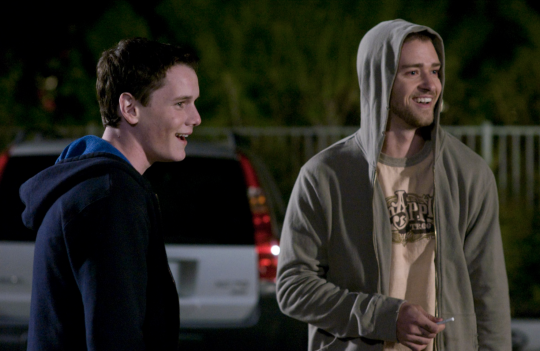
[Last year, Musings paid homage to Produced and Abandoned: The Best Films You’ve Never Seen, a review anthology from the National Society of Film Critics that championed studio orphans from the ‘70s and ‘80s. In the days before the Internet, young cinephiles like myself relied on reference books and anthologies to lead us to films we might not have discovered otherwise. Released in 1990, Produced and Abandoned was a foundational piece of work, introducing me to such wonders as Cutter’s Way, Lost in America, High Tide, Choose Me, Housekeeping, and Fat City. (You can find the full list of entries here.) Our first round of Produced and Abandoned essays included Angelica Jade Bastién on By the Sea, Mike D’Angelo on The Counselor, Judy Berman on Velvet Goldmine, and Keith Phipps on O.C. and Stiggs. Today, Musings concludes our month-long round of essays about tarnished gems, in the hope they’ll get a second look. Or, more likely, a first. —Scott Tobias, editor.]
A decade before the presidency that elevated insults like “betacuck” and “soyboy” into political discourse, Nick Cassavetes made Alpha Dog, a cautionary tragedy about masculinity that audiences ignored. Time for a reappraisal. Alpha Dog is about a real murder. Over a three-day weekend in August of 2000, 15-year-old Zach Mazursky—in reality, named Nicholas Markowitz—is kidnapped and killed by the posse of 20-year-old San Fernando Valley drug dealer Johnny Truelove (Emile Hirsch) with a grudge against Zach’s older brother. No one thought the boy would die, not his main babysitter Frankie (Justin Timberlake), not the girls invited to party with “Stolen Boy,” and not even the boy himself, played with naive perfection by Anton Yelchin, who played video games and pounded beers assuming that his new captor-friends would eventually take him home.
Cassavetes’ daughter went to the same high school as Nicholas Markowitz. The murderers were neighborhood kids and he wanted to understand how fortunate sons with their whole lives ahead of them wound up in prison. The trigger man, Ryan Hoyt—“Elvis” in the film—had never even gotten a speeding ticket. Prosecutor Ron Zonen hoped the publicity around Alpha Dog would help the public spot the real-life Johnny, named Jesse James Hollywood, who was still on the lam despite being one of America’s Most Wanted. So the lawyers gave Cassavetes access to everything: crime scene photos, trial transcripts, psychological profiles, police reports, and their permission to contact the criminals and their parents. Cassavetes even took his actors to meet their counterparts, driving Justin Timberlake to a maximum security prison to get the vibe of the actual Frankie, and introducing Sharon Stone to Nicholas Markowitz’s mother, a broken woman who attempted suicide a dozen times in the years after her son's death.
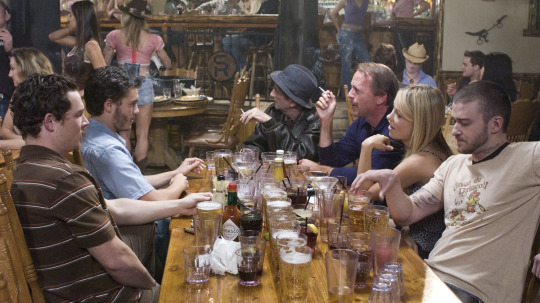
Alpha Dog, pronounced Cassavetes, was “95 percent accurate.” Which was part of why it got buried, thanks to Jesse James Hollywood’s arrest just weeks after the film wrapped. Cassavetes hastily wrote a new ending to the movie, but his problems were just beginning. Hollywood’s lawyers insisted Alpha Dog would prevent their client from getting a fair trial, and used the threat of a mistrial to force Zonen off the case. “I don't know what Zonen was thinking, handing over the files,” gloated Hollywood’s defense team. “It was stupid.”
The publicity, and the delays, dragged out the pain for Markowitz’s family, especially when they heard Cassavetes had paid Hollywood’s father an, er, consulting fee. “Where is the justice in that?” asked the victim's brother. “This just goes on and on, and I’m spending my whole life in a courtroom.”
The film, too, was pushed back a year from its Sundance premiere. Despite casting a visionary young ensemble—Alpha Dog was my own introduction to Yelchin, Ben Foster, Olivia Wilde, Amanda Seyfried, Amber Heard, and the realization that Timberlake, that kid from N*SYNC, could actually act—no one noticed when it slid into theaters in January of 2007. It wasn’t just the bad press. It was that audiences couldn’t get past that Cassavetes’ last film was The Notebook. No way could the guy behind the biggest romantic weepy of a generation make something raw and cool.
But he had. Alpha Dog is a stunning movie about machismo and fate, two tag-team traits that destroy lives. Think Oedipus convincing himself he can outwit the oracle of Delphi. But Sophocles’ Oedipus telegraphs its intentions, elbowing the audience to see the end at the beginning. Greeks sitting down in 405 BC knew they were watching a tale that came full circle. Every step Oedipus takes away from his patricidal destiny just moves him closer to it.
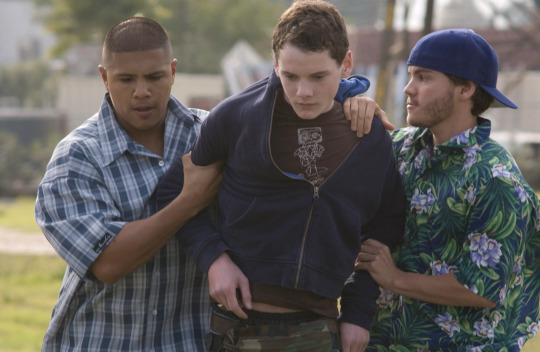
If you map Alpha Dog’s script, instead of a loop, it looks like a horizontal line that plummets off a cliff. For most of its running time, Alpha Dog could pass for a coming-of-age flick where a sheltered kid with an over-protective mom (Sharon Stone) taps into his own self-confidence, right up until the scene where he tumbles into his own grave. Audiences who’d missed the news articles about the case weren’t clued into the climax. Cassavetes doesn’t offer any hints or flash-forwards, not even an ominous “based-on-a-true-story.” (The film might have been more successful if he had.) Instead, he lulls you into joining the kegger, watching Zach crack open beer after beer as though he expects to live forever. “There’s a movie sensibility that the film doesn’t conform to,” said Cassavetes. “You don’t watch this film. You endure it.”
As Zach, his eyes red-rimmed from bong rips, not tears, is shuttled between party dens and wealthy homes, he’s given several chances to escape. He’s even revealed to be a Tae Kwan Do blackbelt who can jokingly flip his captor-buddy Frankie (Justin Timberlake) into a bathtub. But Zach stays put—he doesn’t want to get his big brother Jake (Ben Foster) in more trouble, not realizing that Johnny is too busy making nervous phone calls to his lawyer and his aggro father Sonny (Bruce Willis) to get around to asking Jake for the $1200 in ransom money.
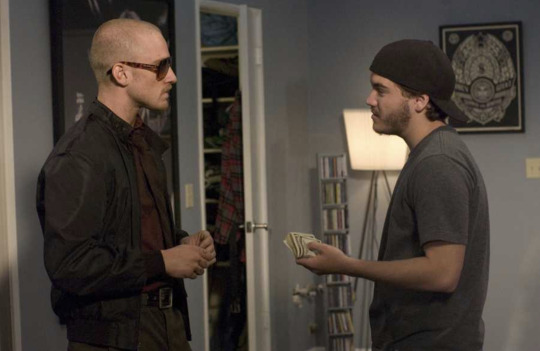
Zach’s death is disorienting, almost as if Psycho's Marion Crane got murdered in the second-to-last reel. In a minivan en route to his execution, he innocently tells Frankie he wants learn to play guitar. “It bugs me that I don’t know how to do anything,” he sighs. Meanwhile Johnny assures his dad that there’s no need to call off the killing. “These guys are such fuck-ups, nothing's gonna happen,” he shrugs, a rare example of cross-cutting that defuses tension in order to make the shock of the gunfire even worse. Up until the last second—even after Frankie binds him with duct tape—a sobbing Zach still can’t believe Frankie would hurt him, and honestly, Frankie can’t believe it himself. And Yelchin’s own early death makes you ache for him to get a happy ending, which Cassavetes dangles just out of reach.
This is how evil happens, says Cassavetes. Masterminds are rare. Instead, people like Frankie can be basically good, but can also be panicky and passive and selfish. Shoving Zach in Johnny’s van was an idiotic impulse by upper middle-class kids, who flipped out when they realized the snatching could get them a lifetime sentence. There’s no honor or glory in the violence. Johnny, the cowardly ringleader, talks tough, but orders his most craven friend, Elvis (Shawn Hatosy), to pull the trigger while he and his girlfriend Angela (Olivia Wilde) get drunk on margaritas. And after the murder, one side effect is that Johnny can’t get an erection. When Angela tries to get Johnny in the mood in their hideout motel, the walls close in on him, suffocating the mood.
Away from his boys, Johnny is weak. Surrounded by them, he's the king. Alpha Dog sets up a culture of animalistic dominance. Johnny’s rental house is basically a primate cage at the zoo, only decorated with weight benches and Scarface posters. All of Johnny’s boys jockey to be his favorite and tear each other down in order to bump up their own rank. Kindness is weakness. When a fellow dealer with the ridiculous nickname Bobby 911 cruises by to negotiate a sale, he snarls at a guy who vouches for him: “You don’t need to tell him I’m good for it, man!”
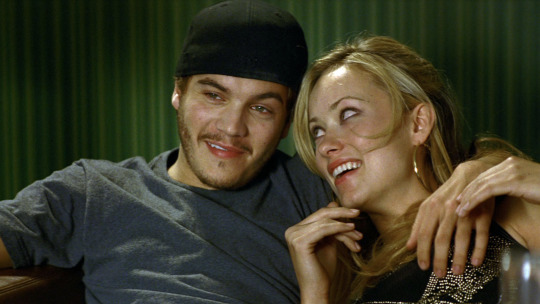
Elvis, the future shooter, is the lowest member of the pack. He can’t ease into the group without Johnny ordering him to go pick up his pit-bull's poop in the backyard. Why do they pick on Elvis? He owes Johnny a bit of money, but the source of the scorn is simply group think. No one wants to be nice to the outcast, and Elvis is just too sincere to be taken seriously. When Elvis offers to get Johnny a beer, the guys tease him for being in love with Johnny. When he says sure, he does care about Johnny, they twist words into a gay panic joke. Elvis can’t win—they won’t let him—so he literally kills to prove his worth, and winds up sentenced to death row, where the real boy, just 21 at the time of the shooting, remains today. Another life wasted.
Cassavetes humanizes the killers because he wants us to understand how their micro decisions add up to murder. Not just the gunmen. Everyone’s a little to blame. The kids who got drunk with “Stolen Boy” and didn’t call the police. The girls who told Zach that being kidnapped made him sexy. Even Zach’s older step-brother Jake, an addict with a twitchy temper who escalates his war with Johnny to a fatal breaking point. Neither boy will back down over a $1200 debt, and there’s an awful split screen call when Johnny dials Jake intending to bring Zach home, but Jake is so boiling over with anger, his Bugs Bunny voice shrieking with outrage, that Johnny just hangs up the phone.
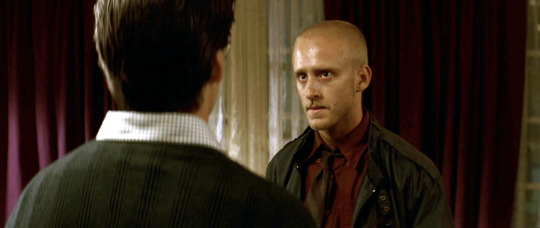
The opening credits, a montage of the cast’s own old home videos, underline that these were young and happy children—the kind of kids people point to as examples of the suburban American ideal. Over a treacly cover of “Somewhere Over the Rainbow,” we watch these real life boys being cultured to be brave: riding bikes, falling off dive-boards, running around with toy guns, going through the rituals of young manhood, from bar mitzvahs to karate lessons. Yelchin—recognizably dark-eyed and solemn even as a toddler—grins wearing plastic vampire teeth.
It takes another ten minutes for Yelchin’s character to sneak into the film sideways in a profile shot eating dinner with his parents, played by Sharon Stone and David Thornton. His Zach is barely even visible as brash Jake barges into the scene to beg for money. They say no, Jake stomps out, and Zach finally makes himself seen when he runs after his brother, begging to go anywhere less suffocating. Zach’s mom loves him so much that she watches him sleep. “I’m not fucking eight!” he yelps. He’s 15—practically a man, in his own imagination—and desperate to get away, even if it means mimicking Jake, a Jewish kid who’s so scrambled that he has a Hebrew tattoo on his clavicle and a swastika inked on his back. Jake starts to say that he wishes his own mom cared about him that much, but as soon as he gets vulnerable, he spins the moment into a joke. “Boo for me,” Jake grins, and takes another swig of beer.
“You could say it’s about drugs or guns or disaffected youth, but this whole thing is about parenting,” grunts Bruce Willis’ Sonny Truelove. “It’s about taking care of your children. You take care of yours, I take care of mine.” He’s half-right—his parenting is half to blame. Sonny and his best friend Cosmo (Harry Dean Stanton) taught Johnny to bully his friends. Cosmo, looking haggard and hollow, mocks Johnny for having one girlfriend. “You gotta plow some fucking fields,” he bellows. “Men are not supposed to be monopolous!” Not that “monopolous” is a real word, and not that Cosmo fends off women himself, except in his own big talk.
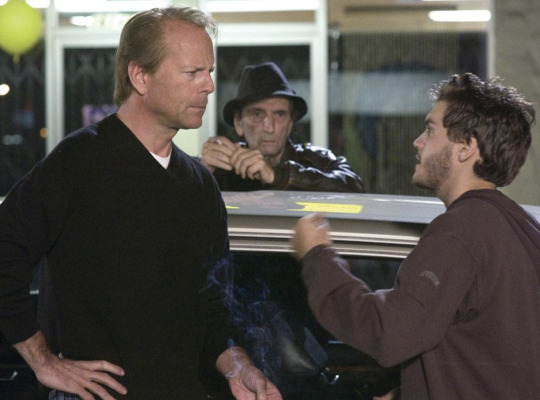
Cosmo and Sonny’s own posturing gradually emerges as being more dangerous than Johnny’s because it's more integrated into society. They’re the type of creeps who rewrite the rulebook to suit them, and attack journalists who try to tell the truth. When a fictitious documentarian asks Sonny about his son's drug connections, the father shrugs, “Did he sell a little weed? Sure.” But when the interviewer presses him further, Sonny snaps, “I’m a taxpayer and I’m a citizen and you are a jerk-off.”
Cassavetes, of course, understands growing up with a father who left a giant footprint to fill. His father, John Cassavetes, the writer-director of Shadows and Faces and A Woman Under the Influence, was one of the major pioneers of independent cinema. He died when Nick was 30, before his son attempted to take up his legacy. “We never really talked film theory,” said Cassavetes. “My experience with my dad was more along the lines of how to be a man, how to be yourself, how to free yourself from what society tells you to do, how to release yourself as an artist.”
It makes sense that Cassavetes would make his own ambitious, and maddeningly singular film. And perhaps it even makes sense to him that fate has yet to give him the reward he’s earned. Alpha Dog deserves to be acknowledged as one of the most incisive examinations of machismo and the banality of evil. But like his fumbling criminals, he knows he’s not really in charge of his life. Admitted Cassavetes, “I'm not smart enough to really have a master plan for my career.”
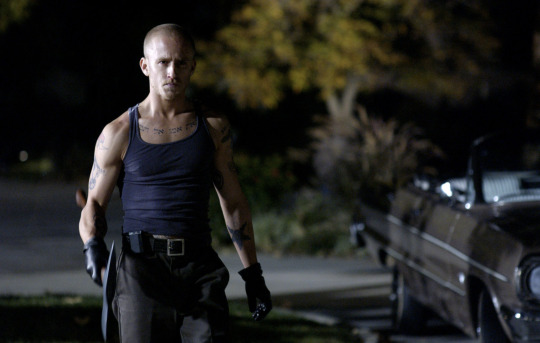
#alpha dog#alpha dog movie#nick cassavetes#john cassavetes#justin timberlake#emile hirsch#ben foster#amanda seyfried#olivia wilde#Nicholas Markowitz#Bruce Willis#Harry Dean Stanton#Oscilloscope Laboratories#O-Scope#musings#film writing
12 notes
·
View notes
Text
Evil in the Mirror: John Carpenter’s Revealing ‘Prince of Darkness’ by Joshua Rothkopf

[Last year, Musings paid homage to Produced and Abandoned: The Best Films You’ve Never Seen, a review anthology from the National Society of Film Critics that championed studio orphans from the ‘70s and ‘80s. In the days before the Internet, young cinephiles like myself relied on reference books and anthologies to lead us to films we might not have discovered otherwise. Released in 1990, Produced and Abandoned was a foundational piece of work, introducing me to such wonders as Cutter’s Way, Lost in America, High Tide, Choose Me, Housekeeping, and Fat City. (You can find the full list of entries here.) Our first round of Produced and Abandoned essays included Angelica Jade Bastién on By the Sea, Mike D’Angelo on The Counselor, Judy Berman on Velvet Goldmine, and Keith Phipps on O.C. and Stiggs. Over the next four weeks, Musings will continue with another round of essays about tarnished gems, in the hope they’ll get a second look. Or, more likely, a first. —Scott Tobias, editor.]
It’s generally accepted that John Carpenter wasn’t a personal filmmaker—not personal in the way that Martin Scorsese, only five years his senior and Italianamerican from the start, was. Carpenter grew up movie-crazy in the ’50s and ’60s. He wanted to make Westerns exactly at the moment when that became an unrealistic career goal. His heroes were Alfred Hitchcock, Orson Welles and, above all, Howard Hawks. It’s been nourishing to listen to Amy Nicholson’s wonderful eight-part podcast Halloween Unmasked, still in progress, and to hear Carpenter—usually oblique in interviews—open up about his boyhood in the Jim Crow–era South. He mentions visiting an insane asylum during a college psych trip and locking eyes with a prisoner who spooked him. That may be the basis for killer Michael Myers but, by and large, this was a guy who wrote what he dreamed up, not what he knew.
That’s not to suggest Carpenter didn’t develop his own signature style. When he arrived in Los Angeles in 1968 to attend film school at USC, he reinvented himself, transforming from a Max Fischer–like creative wunderkind (he was a rock guitarist and high-school class president) into a laconic, bell-bottomed cowboy who listened more than he spoke. He was too cool for nerdy Dan O’Bannon, who worked with him on Dark Star. He was too cool for Hollywood itself, even after he’d succeeded there, rarely mingling socially and turning down projects like Top Gun and Fatal Attraction.
But the cool act was a bit of smokescreen. I once asked Carpenter about it, and he owned up to a private sense of pain in regard to his work. “I take every failure hard,” he told me in 2008, singling out the audience’s abandonment of The Thing, a remake of his favorite film (one that actually improves on its source). “The movie was hated. Even by science-fiction fans. They thought that I had betrayed some kind of trust, and the piling on was insane. Even the original movie's director, Christian Nyby, was dissing me.”
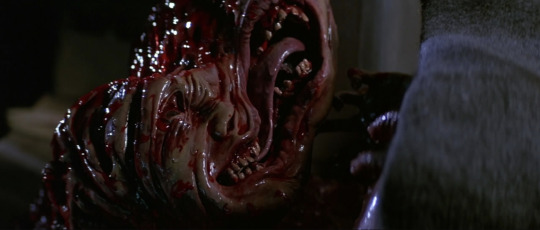
Carpenter would rebound from that 1982 commercial disaster—as well the indignity of getting sacked from Firestarter—by playing the game even better. He directed Jeff Bridges to a Best Actor nomination on Starman (that’s as rare as a unicorn for a sci-fi performance) and, just as things were turning golden, blew all his capital again on 1986’s Big Trouble in Little China, which was rushed and subsequently buried in the massive shadow of Aliens. “You try to make a studio picture your own, but in the end, it’s their film,” Carpenter said in our interview, the Kentucky rascal turned bitter. “And they’re going to get what they want. After that experience, I had to stop playing for the studios for a while and go independent again.”
This is the pivotal moment in Carpenter’s career, the one that fascinates me the most. It should fascinate more people, given what the filmmaker did. Divorced and with a two-year-old son, Carpenter is, at that point, 38 years old. He’s already feeling like a Hollywood burnout, with a decade of ups and downs to prove it. The solution was a pay cut, a big one: Prince of Darkness, financed through “supermensch” Shep Gordon and Alive Films and released in 1987, would be made for a grand total of $3 million, the first title in a multi-picture deal that guaranteed Carpenter complete creative control.

Scrappy but never chintzy, Prince of Darkness is the most lovable of movies. On the surface, it has all the cool minimalism a JC fan could ask for: elegant anamorphic compositions (Gary Kibbe’s muscular cinematography adds millions more in production value), a seesawing synth score, a one-location “siege” structure akin to the director’s Assault on Precinct 13 and The Thing. The movie also has Alice Cooper killing a grad student with a bicycle. It has a swirling canister of green Satanic goo in a church basement.
Critics, by and large, were unkind. In a representative review from the New York Times, Vincent Canby called it “surprisingly cheesy,” singling out first-time screenwriter Martin Quatermass for particular scorn (he “overloads the dialogue with scientific references and is stingy with the surprises”), not realizing that this was a pseudonym for Carpenter himself. Would it have mattered? Released days before Halloween, Prince got clobbered by the gig Carpenter turned down, Fatal Attraction, still surging in its sixth weekend.
But below the surface—and still a matter for wider appreciation—is the film that Carpenter dug himself out of his psychic hellhole to make: his most personal horror movie, starring a version of himself. Prince of Darkness is about watching and waiting. In a way, it’s a romantic view of the auteur’s own time at school. It’s a movie about the evil that stares out of the mirror (i.e., yourself). Like all of his films, it arrived under the possessive title John Carpenter’s Prince of Darkness. In my mind, that apostrophe is actually a contraction: John Carpenter Is Prince of Darkness. And Prince of Darkness is him.
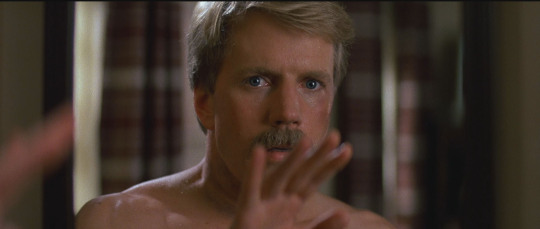
First, let’s understand what $3 million means in 1987. To compare it to some other movies of the same period, Blue Velvet’s budget is twice as large. Hannah and Her Sisters, largely shot in Mia Farrow’s apartment, was funded at $6.4 million. When Scorsese decided to go indie and make his audacious The Last Temptation of Christ, he had a $7 million allowance—and that’s for robes and sandals. Carpenter, on the other hand, would be doing practical special effects in camera. He’d be doing a movie with gore and supernatural nuttiness. In a now-quaint New York Times article from April 1987 titled “Independents Making It Big” (“The major studios have abandoned small, serious, risky films, the kind that often win prizes”), Merchant Ivory’s Oscar-winning A Room With A View gets prime positioning with a big photograph; that one has a $3 million budget, roughly. (Not coincidentally, Carpenter’s financiers, Alive Films, are name-checked in the piece as the producers of Alan Rudolph’s Trouble in Mind.)
Coming off Big Trouble in Little China’s estimated $20 million budget (it was probably more), Carpenter would be making a radical shift. But he agreed to Alive’s terms. He’d return to doing things fast and smart, to distilling his vision down to its cleanest, clearest grammar, to getting it done in 30 days (Halloween was shot in 20, over four weeks in May 1978). Even if you disregard the whole of Prince of Darkness’s content—and we won’t be doing that—Carpenter’s desire to work in total artistic freedom is breathtaking. He will do what it takes to move forward.
A little plot: In Prince of Darkness, scientists, theologians and academics plunge into a dilapidated church where they power up their equipment and study a mysterious genie in a bottle: an “anti-god.” The scenario has some of the pseudo-tech fizz of Poltergeist or, in a lighter vein, the Harold Ramis scenes in Ghostbusters. It’s not meant to hold up under scrutiny. Carpenter, who says he was reading books about quantum uncertainty at the time (maybe not the most comforting bedside material given his professional predicament), gives pages of chewy dialogue to the twin father figures of his oeuvre: Donald Pleasence, returning from Halloween and Escape from New York, plays an unnamed, worried priest; and Big Trouble’s wizened Victor Wong appears as an esteemed professor of metaphysical causality.

If the movie has a conventional hero (it doesn’t), it’s Brian, a student who splits the difference between creepy and generically handsome. He’s played by Jameson Parker, then a TV star on Simon & Simon. Or at least I think it’s Jameson Parker. Unlike his more famous San Diego private detective, Brian sports a robust, porn-star-worthy moustache. It makes him look swarthy, mysterious—a little like the lanky John Carpenter himself, who shoots these early scenes in classrooms and hallways at his alma mater, USC. “I spent many happy years at SC as a film student,” Carpenter says on Shout! Factory’s collector’s Blu-ray. “I really enjoyed myself. I learned everything about how to make movies there.”
Watching Prince of Darkness is as close as we’ll come to seeing the director’s formative years re-enacted, memoir-style. In getting back to basics, Carpenter decided to do it literally. Brian sits in class listening; he has a bit of a Laurie Strode moment looking out the window, distracted. Who is he? He’s a young scientist observing evil, almost flirting with it. He spies on a pretty girl in the courtyard (Lisa Blount). She’s got a boyfriend and it irks him, wordlessly. Later, Brian will woo her to bed and use some hard-core Howard Hawks dialogue on her: “Who was he? The one that gave you such a high opinion of men?” he says, straight out of Lauren Bacall’s playbook in To Have and Have Not. It works. She kisses him.
The movie isn’t all wish-fulfillment. In fact, it’s charming how fully the Carpenter surrogate recedes into the team; Brian isn’t even a factor in the final showdown. Maybe his job is to watch other people vanquish evil. That would make sense, since it’s his creator’s comfort zone. In the meantime, the offscreen Carpenter is building some of his grossest sequences, spraying unsuspecting people in the mouth with streams of ectoplasm (à la Rob Bottin’s landmark FX in The Thing), mounting parallel action and deploying beetles, maggots and ants where necessary.
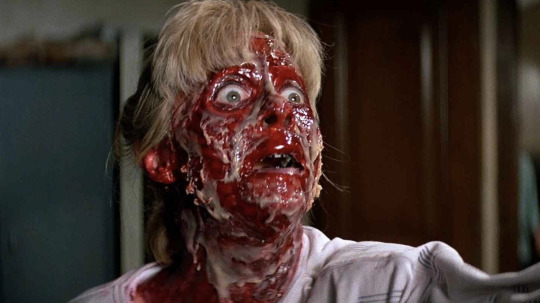
Prince of Darkness has one moment that’s proven unforgettable, transcending even the horror genre. It’s an eerie transmission, the voice slowed down and distorted: “This is not a dream…not a dream…” DJ Shadow samples it a few times on his groundbreaking debut, 1996’s Endtroducing. (The voice is actually Carpenter’s, impossible not to notice once you’ve been made aware of it.) He’s supposed to be a future dude reaching backward in time—“from the year one, nine, nine, nine”—maybe to prevent a biblical apocalypse. All we see is a jittery handheld shot of a silhouetted robed figure slowly emerging from the church, the ominous end-of-the-world smoke gathering.
The economy of the shot is beautiful, Carpenter achieving the texture of a half-remembered nightmare using only a capture-video-off-a-TV-screen trick. (It’s very Inland Empire—and come to think of it, that basement cylinder of swirling green evil is a lot like the glass box from the first episode of the rebooted Twin Peaks: The Return.) So in a situation where Carpenter is facing his most prohibitive spending limits, he’s actually expanding his craft. Prince of Darkness signals his own creative rehabilitation after turning his heel on the studios. Or, to quote the film’s poster: “It is evil. It is real. It is awakening.”
What does it mean that Carpenter’s big payoff involves a mirror? These Cocteau-like shots were some of the most dangerous to pull off. One of them involved plunging a prosthetic hand into highly toxic liquid mercury (a substance the crew had to drain from their hydraulic cranes just to make the gag work). Then, to capture the action on the “other side” of the mirror, poor Lisa Blount had to swim submerged in a darkened swimming pool while an underwater camera shot upward at the glimmering surface. I include these technical details not only to express awe at Carpenter’s commitment (along with that of his collaborators), but also to stress the obvious: The mirror climax was really important to him. The movie’s final seconds are the whole of Prince of Darkness’s reflexivity in a single cut: Brian, woken from a double dream, approaches his bedroom mirror. We see from the perspective of the glass. He touches that porn ’stache tentatively, then reaches out. Cut to black.
It’s not easy to touch that mirror—to walk away from everything you’ve labored to achieve over years, to a place where it’s just you and your talent and what you can do. To me, that’s what Prince of Darkness expresses, subtly. Creatively, the experiment worked: It led directly to Carpenter’s 1988 stealth masterpiece They Live, his most confident political statement and a kindred project in its use of real L.A. locations. That film’s critical reputation has already been defended at large. But maybe it’s time to rally behind the moment slightly earlier, when the director had to rediscover who he was, and what he wanted—and when he found a way to turn everything around.
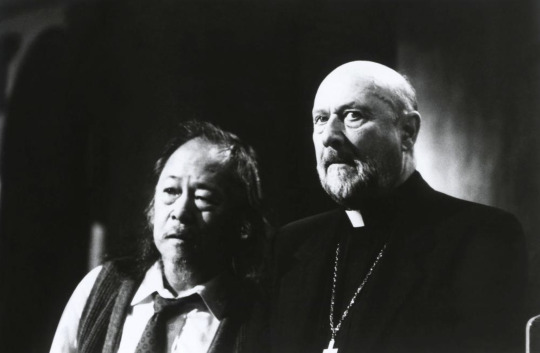
#john carpenter#halloween#prince of darkness#the thing#they live#horror film#produced and abandoned#demon#big trouble in little china#assault on precinct 13#joshua rothkopf#oscilloscope laboratories#o-scope labs#film writing#musings
6 notes
·
View notes
Text
‘O.C. and Stiggs’ And The Utterly Unreleasable, Mind-Roasting Summer Of Robert Altman by Keith Phipps

[This month, Musings pays homage to Produced and Abandoned: The Best Films You’ve Never Seen, a review anthology from the National Society of Film Critics that championed studio orphans from the ‘70s and ‘80s. In the days before the Internet, young cinephiles like myself relied on reference books and anthologies to lead us to film we might not have discovered otherwise. Released in 1990, Produced and Abandoned was a foundational piece of work, introducing me to such wonders as Cutter’s Way, Lost in America, High Tide, Choose Me, Housekeeping, and Fat City. (You can find the full list of entries here.) Over the next four weeks, Musings will offer its own selection of tarnished gems, in the hope they’ll get a second look. Or, more likely, a first. —Scott Tobias, editor.]
Robert Altman was happiest working in the shadows. That’s true of his relationship with Hollywood—where he never fit in, except as the town’s designated maverick—but also true of his relationship with other movies. Altman always had a lot to say about his craft, even if he tended to treat interviews as opportunities to reiterate points he made many times. One talking point he returned to, including when I spoke to him in 2000, is the notion that influence could work backwards. “The directors who’ve probably had the most influence on me,” he said, “were probably names I don’t even know, because I looked at a film that was really bad and I would say, ‘Hmm, I’m never going to do that.’ That’s probably the most direct positive influence on the work I do. I don’t even know who those directors are.”
When talking about Altman, it’s always worth talking about what he was trying not to do as much as what he hoped to accomplish. M*A*S*H can be seen as a war film determined to show viewers what other films would not, from the bloody mess left after battles end to the long stretches of wartime boredom to the sometimes ugly sides of the lifesaving heroes. McCabe and Mrs. Miller is a Western without heroes. The Long Goodbye lets a noir play out in the sunny, counterculture-filled ‘70s Los Angeles.
All of which sort of explains how Altman came to direct the teen comedy O.C. and Stiggs—but only sort of. Shot in 1983—while films like Screwballs, Private School, and Losin’ It rolled out in multiplexes across America—it should have been released to catch the wave of raunchy teen comedies stirred by National Lampoon’s Animal House in 1978 and made into a tsunami by Bob Clark’s Porky’s three years later. But Altman was far from on board with the T&A-filled spirit of the times. When approached by producer Peter Newman, he recalled thinking, in an interview conducted for the film’s DVD release, “This isn’t my kind of film. I don’t know how to do these kinds of films.’ But that was a time when these teenage films were kind of in…mode. And I hated them. I just hated them. And I thought, here’s a chance to do a satire on something that I feel strongly about.” “I went after it,” he added, in a telling choice of phrase, “in that matter.”
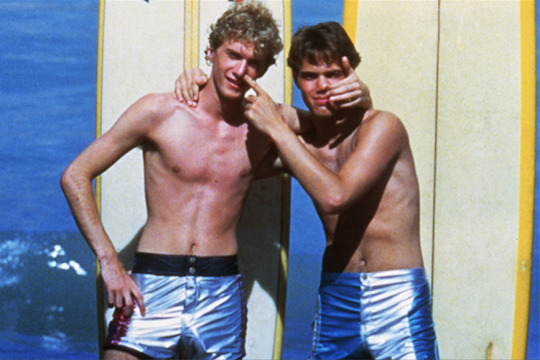
He at least had slightly more prestigious source material from which to draw, if only slightly. Though the film doesn’t bear the National Lampoon name, its title characters, a pair of prank-happy Arizona teens, come from the magazine’s pages. Created by Lampoon writers Ted Mann and Tod Carroll, Oliver “Out Of Control” Ogilvie and Mark Stiggs became favorite recurring characters in the Lampoon’s last gasp of relevance in the early ’80s. Their stories also embodied the changes to the magazine’s spirit in the Reagan era, when the always freewheeling publication started punching down far more often than it punched up. Two children of privilege, the O.C. and Stiggs of its pages enjoy an adolescence filled with excess, abuse, and casual racism and misogyny. Their adventures climaxed with the novella-length “The Utterly Monstrous, Mind-Roasting Summer of O.C. and Stiggs,” which took up the entirety of the Lampoon’s 1982 issue.
It also provided the backbone to Altman’s film, courtesy of a screenplay credited to Mann and Donald Cantrell. In Hunter Stephenson’s extensive history/appreciation of the film, Mann notes that Carroll worked on the script but took his name off the movie. Altman then reworked the script and allowed it to drift further from the original vision thanks to a typically improvisation-friendly set. Really, he had no choice. Altman was never known for being overly respectful of screenplays, but O.C. and Stiggs plays as if he’s compelled to actively work against the source material while still following the outline of the plot. There’s a brutal wit to Mann and Carroll’s stories*, but the teenage nihilism at their core is hard to square with Altman’s sensibility, which could be unsparing of human behavior while still maintaining an underlying respect for human decency.
As such, Wino Bob, the boys’ “Negro derelict” friend, is given all the dignity a character named Wino Bob can hope to have, thanks to a heartfelt performance from Melvin Van Peebles. The heroes’ attempt to shame a pair of teachers in a gay relationship becomes the occasion for one of the teachers to say he doesn’t care. And the film’s central conflict between O.C. and Stiggs’ and the Schwab family, a grotesque suburban clan that’s grown rich from insurance sales, becomes a battle between haves and have-nots, with O.C. now motivated to exact revenge on the Schwabs thanks to the cancellation of his grandfather’s (Ray Walston) health insurance, a development that will send O.C. off to live with relatives in Arkansas at the end of the summer unless something can be done. What emerged looks more like an Altman movie than, say, Fraternity Vacation, but it’s a strange beast nonetheless, a Brundlefly-like hybrid that’s not really equipped to live in any known movie habitat. There’s too much overlapping dialogue and restless camerawork, to say nothing of the virtual absence of nudity, for Porky’s fans, too many outrageous pranks for the arthouse.
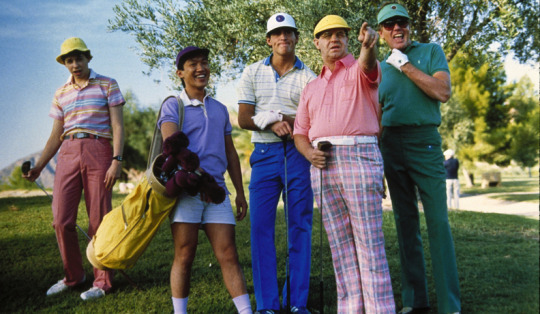
That might explain why MGM didn’t know what to do with the movie, shelving it after disastrous screenings in 1984, which came and went without a release. So did 1985. And 1986. And though the film apparently played some theaters in 1987, it didn’t reach New York until 1988, when it appeared at Film Forum as part of a Dennis Hopper retrospective. Most viewers who encountered it did so on VHS in the late ‘80s, when it already looked like a lost film from a bygone time, the T&A comedies of the early ‘80s having given way to the more sympathetic efforts of another Lampoon alum, John Hughes. (If nothing else, Jon Cryer, who plays the much-tormented Randall Schwab, already looked noticeably younger in his feature debut by the time saw the light of day.)
Yet while O.C. and Stiggs will deservedly never be mentioned near the top of any Altman ranking of the director’s film (or, if we’re being honest, too close to the middle), there’s nothing else quite like it. Both Daniel H. Jenkins and Neil Barry (O.C. and Stiggs, respectively) make for appealing leads, embodying their characters’ screw-it-all, question everything, respect nothing teenage attitude without making them seem heartless. (That spirit in two lines: “I want you to call me Stiggs. It sounds more ridiculous.”) And for every obvious flaw, there’s some compensating element. A big wedding set piece doesn’t really go anywhere, but it does feature a charming dance sequence between Jenkins and Cynthia Nixon (both of whom would stay in Altman’s orbit for a while). The comedy falls flat in the action finale, but it does feature a bizarre, self-parodying performance from Dennis Hopper as a Vietnam vet for whom the war never ended. Some sections drag, but Altman throws in a winning concert scene from King Sunny Ade. Also featured: Jane Curtin as an inventive alcoholic mom for whom every object can double as a place to hide booze, a supremely chill Martin Mull, Bob Uecker, and a cameo from Hal Phillip Walker (Thomas Hal Phillips), the third-party candidate whose cryptic proclamations filled the background of Nashville.
It’s a film that time has only made more intriguing, thanks to its unmistakable Altman-ness, its undeniable eighties-ness, and the uneasy alliance the film forces between the two. Altman “went after” the ‘80s teen movie, and though the genre barely noticed his attack, the resulting film remains a disjointed but spirited critique of Reagan-era values and a salute to the teen spirit of subversion, even if that subversion took the form of driving around in a suped-up car with monster truck tires on it just to annoy the squares.
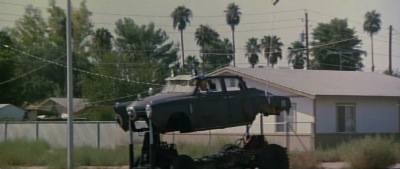
The film first came to my attention, years after its release, via my friend Todd Hanson, a gifted writer for The Onion whose pop culture enthusiasms had a way of getting passed from co-worker to co-worker. When I got the chance to speak to Altman, I knew I had to devote at least a few of my previous 20-minute slot to what had by then become an office-wide obsession. “I was attacking the teen mentality of the audience,” he said, “and I just was a little too… Nobody got it.”
Looking back, it might be that not enough tried. At that low ebb of Altman’s commercial fortunes—post-Popeye, pre-Player—he’d become too easy to take for granted and an odd, flawed, but undeniably one-of-a-kind film could be dismissed as just another ‘80s misstep. Maybe it seemed like we’d have Altman movies forever, and the era in which studios might somehow find themselves funding impossible-to-define oddities that doubled as single-finger salutes to the bad taste of their intended audience would never end.
* In an odd case of two geniuses drawing inspiration from an unlikely source, Mann and Carroll’s stories also inspired D.R. and Quinch, an early writing effort from comics great Alan Moore.
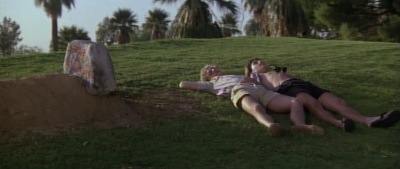
#robert altman#o.c. and stiggs#popeye#the player#the onion#national lampoon's animal house#screwballs#private school#losin' it#fraternity vacation#porky's#musings#oscilloscope laboratories
16 notes
·
View notes